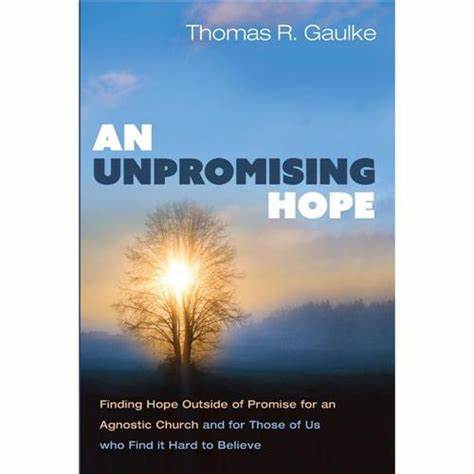An Unpromising Hope
An Unpromising Hope: Finding Hope Outside of Promise for an Agnostic Church and for Those of Us who Find it Hard to Believe, Thomas R. Gaulke (Pickwick, Eugene, OR, 2021).
Illusive Hope
Before reading this book I took the feeling of hope for granted. It was similar to joy, peace and love. At times I might experience its absence or scarcity, but with a little diligent effort on my part it could be rediscovered, renewed. When I was a young Christian, hope was part and parcel with my faith in God. I could be hopeful because of a loving God’s activity in my life. My ultimate hope was in Jesus’ promise to come again and establish God’s kingdom on earth.
God’s kingdom has been the source of hope for generations of Christians. It is the inspiration and motivation that sparked the liberation theology movement. But where is the hope for people who identify themselves as “agnostic” and believe God is not actively involved in creation? Or, people who struggle to believe in a divine being, where do they find hope? These are the questions posed by Thomas Gaulke in his book, An Unpromising Hope. These are the questions he seeks to answer.
Gaulke begins with the assertion that not all of the faithful are full of faith. A significant block of congregants are agnostic or borderline atheist. Refusing to pass judgment on the doubtful and the hopeless, Gaulke graciously seeks to discover alternate sources of hope, from which people can draw. This new found hope is able to motivate people (as did the hope of liberation theology) to live beyond themselves and work toward a better world.
An Unpromising Hope, is a survey of philosophers, theorists, theologians and womanist theologians. It is not an exhaustive study, but it does provide readers with an overview of various thoughts. Gaulke’s comments on each source of “unpromising hope” are balanced, concise and clearly stated. Readers are able to walk along new, unfamiliar paths without fear of getting lost. They can reflect on fresh thoughts and ideas to determine if the hope offered speaks to them.
I like this book. I like it because it is realistic about the struggle many people have with faith and hope today. The gracious non-judgmentalism appeals to me. Traditional Christians are not labeled “naïve,” and doubters are not tagged as sinful. I learned new ideas and saw hope from a different perspective. All helped me take a few more steps along my personal journey of faith and discovery. I am confident that this book will do the same for other readers.
I received this book free from the author and/or publisher through the Speakeasy blogging book review network. I was not required to write a positive review. The opinions I have expressed are my own. I am disclosing this in accordance with the Federal Trade Commission’s 16 CFR, Part 255.

